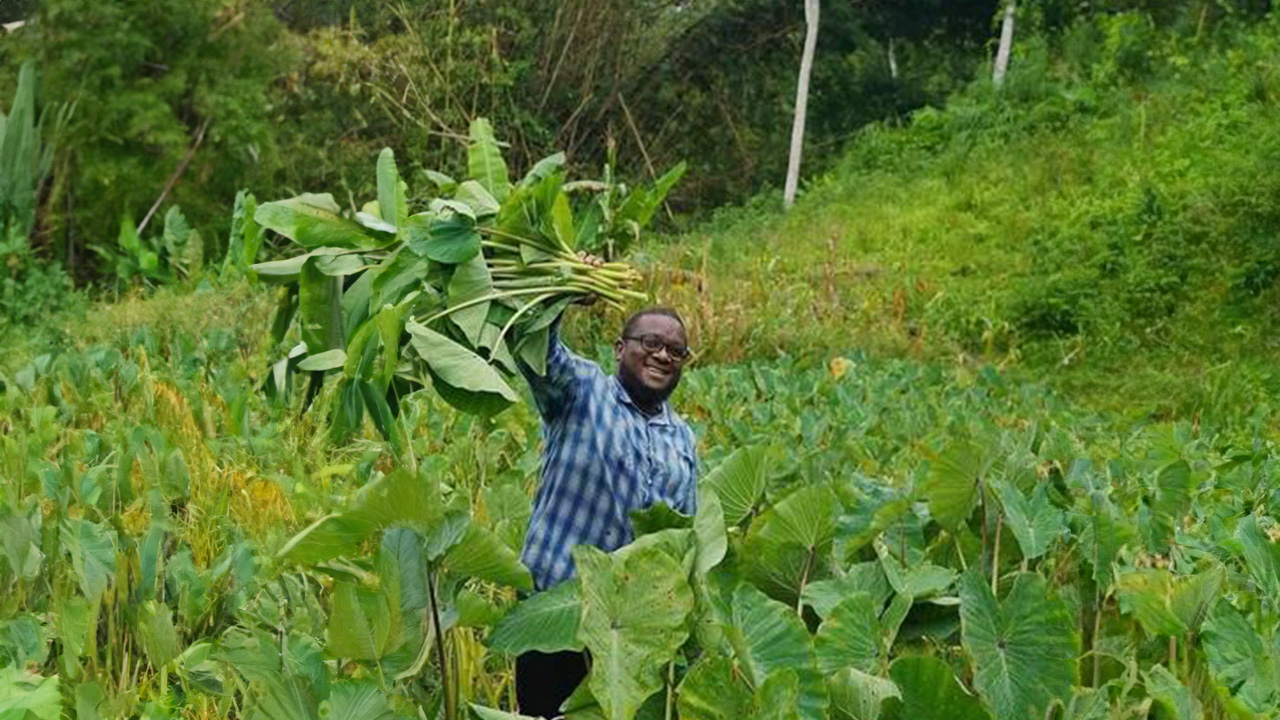content body
Alpha Sennon may only be in his second semester of Auburn University’s agriscience education doctoral program, but he’s already very much in demand as a popular speaker at conventions and conferences around the world.
“I’m a performer because I’m a steel pan player,” Sennon said. “So, when I go on stage and see the audience and enthusiasm, all nervousness ends and I’m just ready to energize the room.”
A native of Trinidad and Tobago, he is the founder of an NGO called WHY FARM (We Help You-th FARM) and a minor celebrity in the agricultural education world. Sennon has received funding from the Bill & Melinda Gates Foundation, given a TEDx talk in Amsterdam and been featured in Forbes Magazine not once, but twice.
Through WHY FARM, he creates and distributes materials he calls “agri-edu-tainment,” including a comic book series, YouTube videos and a soon-to-be-released video game. He’s invented a superhero he calls “Agriman,” who shows readers how farmers feed the world. Not one to shy away from ambitious ideas, Sennon hopes to take Agriman to the big screen some day in a full-length feature film for children.
“You have to inspire them, plant the seeds in their minds and let them know agriculture is a career option,” he said. “Many times, a child says they want to be a doctor or a pilot. You don’t have every child say, ‘I want to be a farmer.’”
And Sennon knows exactly what children say, because he hosts class trips to his family’s farm and presents educational programs in schools every week, whether it’s at home in Trinidad or wherever he happens to be traveling. He knows the children he meets likely have a negative perception of farming, so he brings energy and enthusiasm through singing, rapping and rhyming songs that spark their interest in farming and growing healthy foods.

Doctoral student Alpha Sennon has invented a superhero he calls “AGRIman,” who teaches readers that farmers feed the world.
WHY agricultural education?
One visit to an elementary school stands out in his mind as the perfect example of why he does the work he does. It was career day, and every student was dressed as the type of professional they wanted to grow up to be; there were doctors, lawyers, teachers and police officers — but no farmers. One young girl told him she had been planning to dress as a farmer, but changed her mind at the last minute when her friends laughed at her.
“I got emotional when I heard that, but it was a good lesson for me,” he said. “I had to convince the entire class to pursue a career in agriculture, and when I was finished with them, if there were farmer suits selling right there, everyone would be wearing a suit because of the information I gave them.”
Sennon knows the hurdles he must overcome are significant; in the Caribbean, agricultural work is often associated with colonization and slavery. Although those experiences are in the past, the negative perception of farming has been passed down through generations in many families.
“A lot of what we do is fighting against that,” he said. “So, when I do master classes for adults, my job is to rewire them, to find a way to reverse that psyche in their minds. Yes, the actions that led to that were bad, but the act of farming is good.”

Sennon is very much in demand as a popular speaker at conventions and conferences around the world.
WHY Auburn?
So how did a farmer, speaker and educator like Sennon end up at Auburn?
Alumni Professor James Lindner has been taking students to Trinidad and Tobago for research and study abroad trips for decades. Through his family’s involvement in the agriculture industry, Sennon met Lindner when he was a young child and has hosted him and his students for years.
“Jimmy is almost like my godfather,” he said. “You almost wouldn’t think he’s American when he’s in Trinidad. He blends into the culture nicely.”
When Lindner suggested earning a doctorate might open new doors for his organization, Sennon knew there was no other place to go but Auburn. He’s already making plans for his dissertation research, which will focus on delivering data that illustrates the best methods for building and maintaining children’s enthusiasm for agriculture. As someone who has a way with words, Sennon is already referring to his dissertation at Auburn as “real-search.”
“I haven’t been too much in academia, because I’m on the ground,” he said. “I’m on the farm; I see a hundred kids a day. Maybe I’m biased, but I feel like I already know what it takes. I’m grateful for the Auburn faculty and staff who have embraced my work.”
WHY Farm?
When he’s not taking classes, growing vegetables or speaking about the importance of farming, Sennon is busy raising funds to build an online platform with a free elementary school agriculture curriculum. He wants to make it easy for teachers to engage their students by offering stories, animations and lesson plans. He is highly driven to spread the importance of agriculture and his love of farming to those audiences who can be most impacted.
“Changing a kid’s mind isn’t that hard,” he said. “They are still very much open to receiving information, and you can convince them, but it’s all in how you do it. You can’t just come in and put on a white board, ‘be a farmer;’ that’s not going to work. They want to see excitement and joy, and that is what will change their mind.”
Soon, Sennon and his College of Education classmates will have a massive new building for learning and research.
Take a virtual tour of this state-of-the-art facility.






